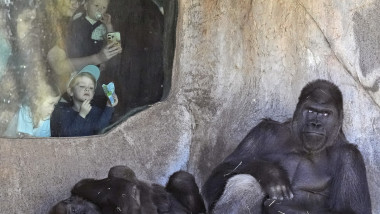How do animals react during a total solar eclipse? Scientists plan to find out in April
When a total solar eclipse transforms day into night, will tortoises start acting romantic? Will giraffes gallop? Will apes sing odd notes?
Researchers will be standing by to observe how animals’ routines at the Fort Worth Zoo in Texas are disrupted when skies dim on April 8. They previously detected other strange animal behaviors in 2017 at a South Carolina zoo that was in the path of total darkness.
“To our astonishment, most of the animals did surprising things,” said Adam Hartstone-Rose, a North Carolina State University researcher who led the observations published in the journal Animals.
